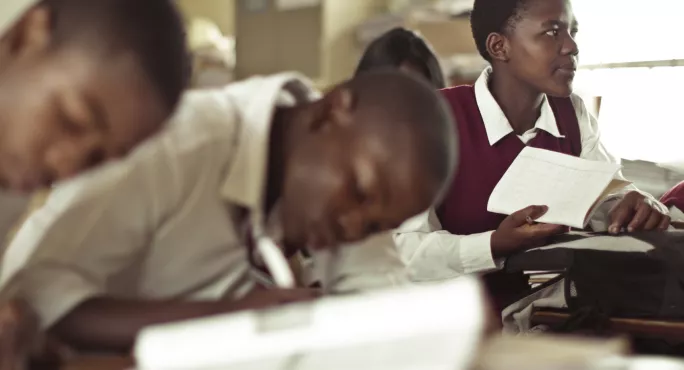Imagine you’ve been asked to teach a lesson on letter formation. Simple, right?
Now imagine you’ve been told that you don’t have access to any technology more complex than a blackboard and some chalk - including for your lesson planning. And you have to teach nearly 70 children. And their ages range from 10 to 17.
This isn’t some view of a dystopian future: it’s the reality for teachers in classrooms across the developing world. Conflict, emergencies and protracted crises - think of the three-year Ebola epidemic that ravaged West Africa recently - continue to affect millions of children.
Globally, 65 million children are directly affected by emergencies and protracted crises: 476 million children live in countries affected by crises that make it nearly impossible to get a full, decent education. The percentage of out-of-school children living in areas affected by conflict has risen from 42 per cent to more than 50 per cent since 2008.
Learning crisis
These are stark and sobering statistics. When you consider that an estimated 122 million youth worldwide are illiterate, you can see that poorer countries are in the grip of a full-scale learning crisis.
But what can we do about that? It’s a question that we here at Tes asked ourselves. And Save the Children UK had the answer. It has been working to build programmes of accelerated education for schools in areas that have been affected by some of the issues mentioned above. This means that children who have missed out on any or all of their primary education, for whatever reason, can be taught literacy and numeracy in a shorter span, enabling them to shorten or bridge the gap between them and their better-educated peers.
What Save the Children UK needs are teaching resources. Activities that don’t depend on digital whiteboards, printouts or anything more technical than a teacher, a student and a workbook. Lessons that teach the simplest of concepts without patronising the children - often teenagers - learning them.
Instant impact
What we need to achieve this is you. We’re running a CPD day this Saturday (25 November), where teachers will come together to talk about schemes of work in accelerated education for the next two terms - and work out some ideas that teachers in developing countries can use. These ideas, these activities, will be used as soon as January in countries such as the Democratic Republic of the Congo and Sierra Leone. Simply put, the work done will have an almost instant impact in classrooms where an impact is most needed.
So, if you don’t have plans on Saturday, if you like the idea of donating your time and talents to a worthwhile project and if you like the idea of quite a bit of free food, come along - you’ll also get to hear from former Tes blogger of the year Natalie Scott, who’ll be sharing her experiences in the Calais Jungle refugee camp and talking about the practicalities of teaching in such an environment. You can book your place here.
Want to keep up with the latest education news and opinion? Follow Tes on Twitter and Instagram, and like Tes on Facebook




